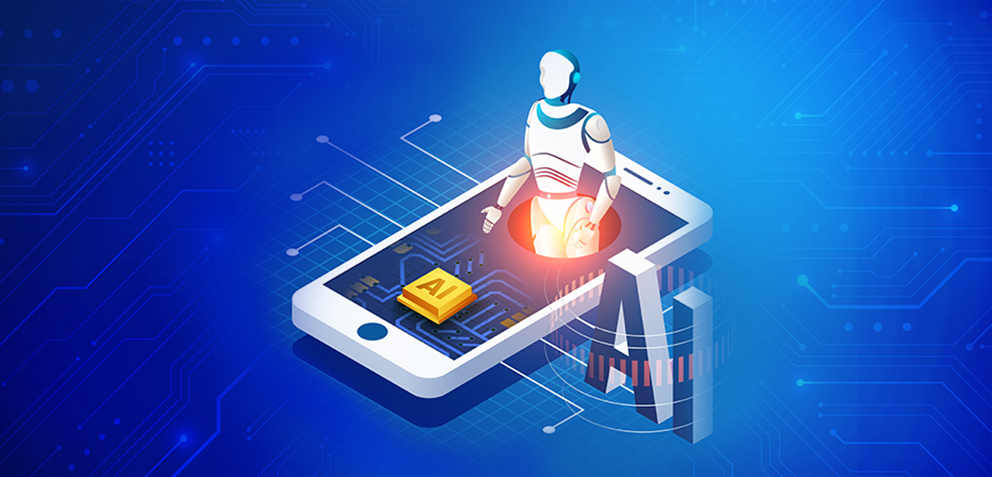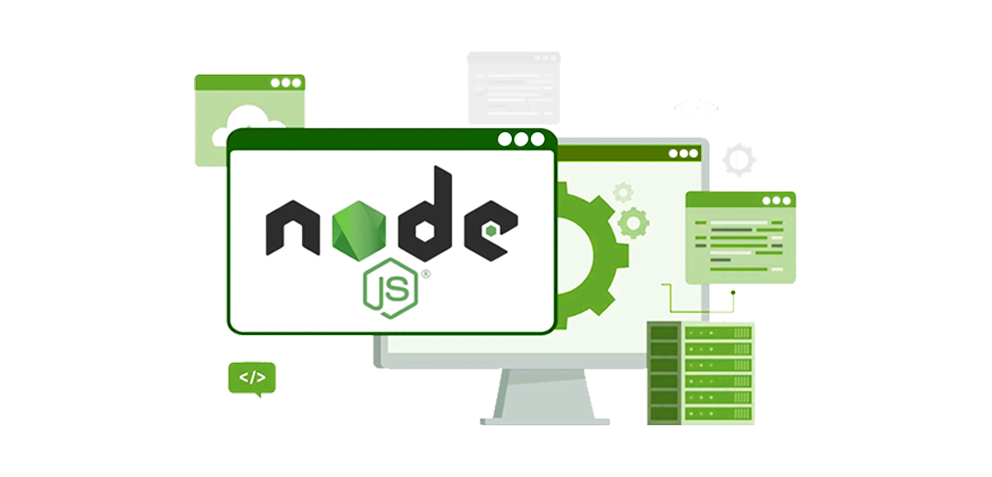Ultimate Guide to eLearning App Development
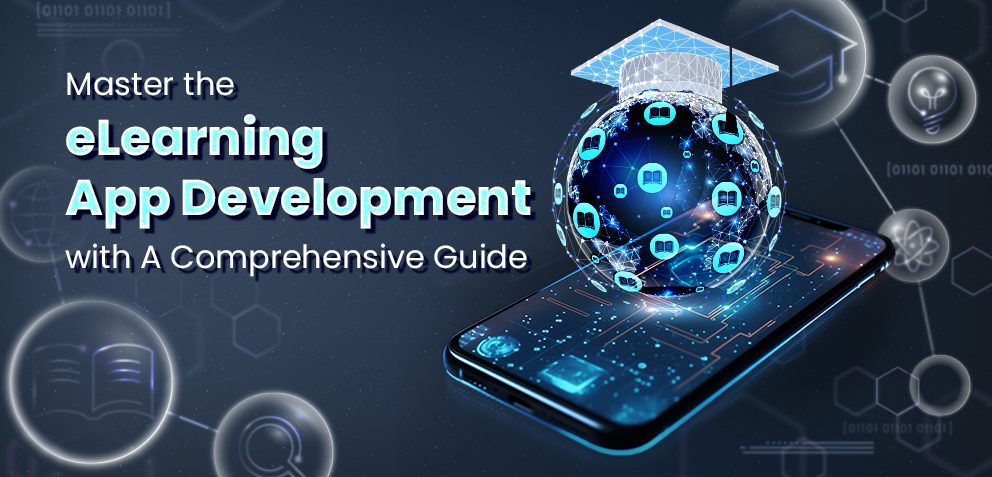
Table Of Contents
 Stay In-the-loop
Stay In-the-loop
Get fresh tech & marketing insights delivered right to your inbox.
Share this Article
Tags
Category
- .Net Developer
- Adtech
- Android App Development
- API
- App Store
- Artificial Intelligence
- Blockchain Development
- Chatbot Development
- CMS Development
- Cybersecurity
- Data Security
- Dedicated Developers
- Digital Marketing
- Ecommerce Development
- Edtech
- Fintech
- Flutter app development
- Full Stack Development
- Healthcare Tech
- Hybrid App Development
- iOS App Development
- IT Project Management
- JavaScript development
- Laravel Development
- Magento Development
- MEAN Stack Developer
- MERN Stack Developer
- Mobile App
- Mobile App Development
- Nodejs Development
- Progressive Web Application
- python development
- QA and testing
- Quality Engineering
- React Native
- SaaS
- SEO
- Shopify Development
- Software Development
- Software Outsourcing
- Staff Augmentation
- UI/UX Development
- Web analytics tools
- Wordpress Development
Over time, the eLearning sector has changed briskly, primarily driven by tech progress and the rising need for learning that’s flexible and available. Thanks to swift developments in mobile tech and widespread internet use, modern education sees a big demand for eLearning apps.
This detailed guide will be directed toward developing eLearning applications, emphasizing Custom LMS Solution Development Services, Mobile App Development, EdTech Software Development, and so forth.
Whether you are an educational institution, a corporate trainer, or an entrepreneur, this guide will give you the relevant knowledge on how to create a successful eLearning app. So, without further ado, let’s get started!
Navigate the Digital Learning Frontier
Digital learning, or digital education, has taken a different approach to educating and training people. Traditional classroom settings no longer remain the sole mode of instruction delivery. With the innovation of the Internet and mobile devices, learning has become possible everywhere, any time.
This set the scene for eLearning apps as interactive, customized, and engaging learning methods. Digital education’s flexibility and scalability made it very tenable for learners and educators alike, so much so that it increased the growth curve of the eLearning market tremendously.
What is eLearning App Development?
Creating eLearning apps is about making software tools for online education. These tools can be simple, like flashcard programs, or intricate, like platforms crammed with varied educational content and interactive parts.
Critical components of eLearning app development include:
Custom LMS Solutions Development Services: Learning management systems, or LMS, organize, deliver, and keep track of teaching materials. Customized LMS tools are crafted to satisfy diverse needs, from schools to workplace training courses.
Mobile App Development: Smartphones and tablets are everywhere. This makes mobile app development crucial for creating eLearning tools designed for our busy lives. Mobile apps offer a handy, adjustable method to interact with educational content.
EdTech Software Development: EdTech, short for Educational Technology, is a broad term that covers various software aimed at enhancing learning experiences. In other words, EdTech software development is about creating new gadgets that employ tech to assist with improved learning outcomes.
Market Insights
There’s a surge in the eLearning world. Why? More folks are using digital learning systems. According to FMI experts, the edtech market is predicted to skyrocket from $108.246 billion in 2024 to $411.566 billion by 2034. So, how will it happen?
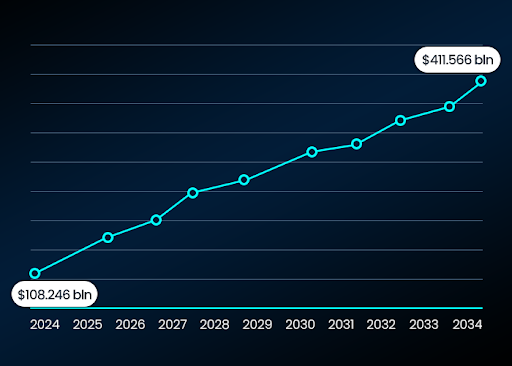
- Internet Penetration: With the internet expanding across the globe, more people have access to online education.
- Advances in Mobile Technology: Increased use of smartphones and tablets makes mobile learning readily available and convenient.
- Growing Need for Skill Development: In a rapidly evolving world, people must learn daily to upgrade themselves, increasing demand for eLearning solutions.
- Corporate Training: Companies increasingly use various eLearning solutions, including mobile ones- to train their employees most flexibly and least cost-effectively.
Empower Your Learners With Our Cutting-Edge LMS Solutions Today!
Benefits of Mobile Learning Apps
There can be a lot of benefits derived by both learners and educators through mobile learning applications. The main advantages include:
Accessibility: Mobile learning apps make educational material available at any time to people with this kind of app, thus making learning more flexible and convenient. This can be particularly interesting for people working with busy schedules or living in remote areas.
Personalization: Such applications may be adjusted to individual learning preferences and needs, thus further personalizing the learning experience. Adaptive learning paths, personal recommendations, and customizable content ensure that each learner obtains an educationally unique experience.
Scalability: As eLearning apps can reach many users concurrently, scaling educational programs is progressively easier. This is especially useful for organizations that intend to train a global workforce or academic institutions to further their reach.
More Advantages: Mobile learning apps save travel and classroom costs, which are required under the traditional education method. Infrastructure costs are saved for institutions while commuting and accommodation costs are saved for learners.
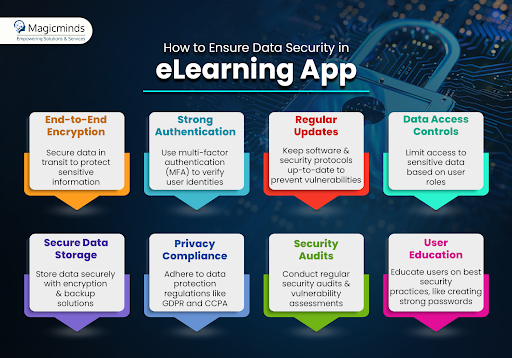
Key Features of Successful eLearning Apps
Some important must-have features for your eLearning app to ensure an enhanced learning experience are:
Clean and intuitive interface: Ensure that users will navigate the app easily, so they can focus on learning. The design should be simple yet effective, reducing any kind of learning curve for new users.
Interactive learning content: Multimedia-based learning content such as videos, animations, and quizzes can deliver information more effectively. Interactive learning content breaks traditional learning methods’ monotony and keeps learners actively involved.
Customization: Personalization can be achieved by setting up adaptive learning pathways, customizing content, and personalizing recommendations to help tailor the learning experience to every individual’s needs. Through this personalization, the learners can confidently deliver relevant and challenging content, thus improving their overall learning experience.
Offline access: It allows the user to download content and hence get access to it even when offline. This ensures no breaks in learning due to internet connectivity issues, which is very important for learners in unstable internet connection areas or who prefer to study on the move without using mobile data.
Social learning: Adding social components such as chat rooms, feedback from mates, and group work can foster a community feeling, boosting engagement in learning. It provides learners with a chance to communicate, exchange ideas, and collaborate on different subjects.
In addition, progress-tracking features further spur motivation and accountability by allowing learners to monitor their progress and work toward meaningful objectives. Progress tracking will enable them to feel this sense of accomplishment with a specific focus on learning objectives.
Best Practices in Developing an eLearning App
Developing a successful eLearning app requires careful planning and adherence to best practices. Here are the key considerations:
#1 Know Your Audience
Dig deep. Find out what your crowd loves, hates, or struggles with. This can help build an app that meets their wants. To know what eLearning app features your audience craves, use surveys, chats, or group discussions.
#2 Focus on the User Experience
We need a design that’s all about the user, simple, and a breeze to navigate. The app must work seamlessly across various gadgets. This is how we make sure that our users enjoy the app, feel attached to it, and want to use it repeatedly.
#3 Leverage the Technology
Employ the latest technologies like AI, ML, and AR to bring new, more engaging learning experiences. New technologies can help personalize learning by recommending the right content, creating engaging experiences, and saving time through automation in the learning process.
#4 Data Security
Implement robust security policies to safeguard user data and comply with data protection laws. Most eLearning apps cater to sensitive information, including personal information and educational records; hence, the application becomes necessary for end-to-end data security.
#5 Test Regularly
Extensive tests should be conducted to identify and rectify bugs or other issues before the application’s release. Feedback from the beta testers should be considered before executing improvement measures. Testing should be performed on functionality, usability, performance, and security levels.
ALSO READ – Mobile App Development Security: Essential Guidelines
Ready To Make A Splash? Start Your App Development Journey With Us & Future-proof Your Business!
Share Your Project Requirements!Technology Trends Revolutionizing the Education Sector
Several trends in technology are molding the future of education and are changing the way we learn. Some of the most influential trends are:
Artificial Intelligence: AI-backed resources can tailor learning journeys with smart guidance and handle lots of paperwork automatically. Scientists are digging deep into Artificial Intelligence currently. Their goal? To make sure AI studies student info, provides custom material for students, and spots potential challenges students might face.
Machine Learning: ML algorithms can analyze learner data to provide personalized recommendations and predict learning outcomes. Through Machine Learning, patterns and trends from learner behavior are built, giving educators insights to make data-driven decisions.
AR and VR: AR and VR can simulate learning experiences through which learners can explore virtual environments and manipulate 3D objects. These technologies can make complex subjects more understandable and engaging.
Blockchain: Blockchain tech makes educational credentials safer and speeds up the sharing of academic files. It safeguards credentials from changes while making them simple to check, boosting trust in online certificates.
ALSO READ – Blockchain in Fintech: A Glimpse into 2024 and Beyond
Gamification: Employing parts of game design, like points or badges and scores, in a setup that’s not a game could make learning more enjoyable and drive motivation. With this gamification approach, individuals might feel the push to finish their courses, engage in various skills-boosting activities, and reach important learning points.
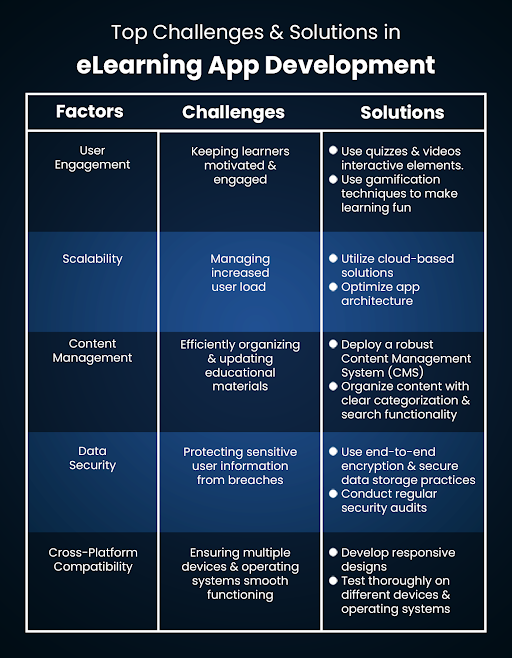
Essential Steps for Developing Your eLearning App
The development of a successful eLearning app comprises a few major steps to be taken. The steps are stated as follows for your quick start:
#1 Define Your Goals
Be very clear about the objectives of your eLearning app and who it will target. This understanding will help you stay focused and guarantee that the app suits the purpose for which users will use it.
#2 Research The Market & Choose Technology
Know the competition, what voids your app can fill, and determine what makes it unique. Research could allow you to learn what works and what does not to create a competitive yet very new app.
Additionally, determine your target audience’s needs and preferences to choose the right technology stack for the app’s development. The technology stack should support scalability, high performance, and security.
#3 User Interface Design
This involves the development of an intuitive and user-friendly interface for making the product more appealing. It must be usable and accessible to ensure that the learning process proceeds without a glitch. The design has to be consistent, with design principles behind it, for a better user experience.
#4 Build the App
It will be built using agile development methodologies so that it is flexible and adaptable. We will work with the best developers and brilliant designers to create a high-quality product to achieve this. Agile development methodologies include iterative development techniques to drive continuous refinement based on feedback.
#5 Test and Refine
Conduct thorough testing so that every issue can be fixed. Involve beta testers and collect feedback; make improvements as necessary. Test for all potential use scenarios to fault-proof the application as much as possible.
#6 Design and Launch
Finally, after developing the app, integrate all of the above steps into it, test it several times for user-friendliness, and then launch it. Conduct an integrated marketing campaign to popularize the application among end-users.
Marketing involves using different channels to reach the target segment and increase awareness. These channels can include social media, content, email, and others. Besides, you must hire dedicated developers to create and launch your eLearning app.
#7 Feedback and Update
Gather feedback from users continuously to determine areas for improvement. Follow up on the app by updating it frequently for maintenance issues, feature enhancements, and user experience optimization. Updating the application will ensure its applicability and competitiveness in the fast-paced eLearning market.
Transform Your Education With Our Robust EdTech Solution & Turn Your Institution Into A Digital Learning Powerhouse!
Experience Magicminds’ eLearning Mobile App Solution
eLearning app development is a dynamic area of constant change, driven by technological advances and changing educational needs. A Custom mobile application can be the ideal solution for any educational organization and corporate world.
That’s where Magicminds comes into the scene! Our all-inclusive custom eLearning solution is designed to meet the modern education demand. Whether you want to teach people worldwide or enhance corporate training programs, our eLearning apps are a powerful solution to deliver flexible, interactive, and engaging learning opportunities.
Well, don’t go by words; our loud & proud numbers speak for us!
Don’t miss out on your chance to experience a unique and innovative mobile application for education. Get in touch with us, and let us turn your app ideas into a success story! Contact Us!
Over time, the eLearning sector has changed briskly, primarily driven by tech progress and the rising need for learning that’s flexible and available. Thanks to swift developments in mobile tech and widespread internet use, modern education sees a big demand for eLearning apps. This detailed guide will be directed toward developing eLearning applications, emphasizing Custom LMS Solution Development Services, Mobile App Development, EdTech Software Development, and so forth.
Whether you are an educational institution, a corporate trainer, or an entrepreneur, this guide will give you the relevant knowledge on how to create a successful eLearning app. So, without further ado, let’s get started!
| Table of Contents!
Navigate the Digital Learning Frontier What is eLearning App Development?
Market Insights
Benefits of Mobile Learning Apps
Key Features of Successful eLearning Apps
Best Practices in Developing an eLearning App
Technology Trends Revolutionizing the Education Sector
Essential Steps for Developing Your eLearning App
Experience Magicminds’ eLearning Mobile App Solution |
Navigate the Digital Learning Frontier
Digital learning, or digital education, has taken a different approach to educating and training people. Traditional classroom settings no longer remain the sole mode of instruction delivery. With the innovation of the Internet and mobile devices, learning has become possible everywhere, any time.
This set the scene for eLearning apps as interactive, customized, and engaging learning methods. Digital education’s flexibility and scalability made it very tenable for learners and educators alike, so much so that it increased the growth curve of the eLearning market tremendously.
What is eLearning App Development?
Creating eLearning apps is about making software tools for online education. These tools can be simple, like flashcard programs, or intricate, like platforms crammed with varied educational content and interactive parts.
Critical components of eLearning app development include:
Custom LMS Solutions Development Services: Learning management systems, or LMS, organize, deliver, and keep track of teaching materials. Customized LMS tools are crafted to satisfy diverse needs, from schools to workplace training courses.
Mobile App Development: Smartphones and tablets are everywhere. This makes mobile app development crucial for creating eLearning tools designed for our busy lives. Mobile apps offer a handy, adjustable method to interact with educational content.
EdTech Software Development: EdTech, short for Educational Technology, is a broad term that covers various software aimed at enhancing learning experiences. In other words, EdTech software development is about creating new gadgets that employ tech to assist with improved learning outcomes.
Market Insights
There’s a surge in the eLearning world. Why? More folks are using digital learning systems. According to FMI experts, the edtech market is predicted to skyrocket from $108.246 billion in 2024 to $411.566 billion by 2034. So, how will it happen?
- Internet Penetration: With the internet expanding across the globe, more people have access to online education.
- Advances in Mobile Technology: Increased use of smartphones and tablets makes mobile learning readily available and convenient.
- Growing Need for Skill Development: In a rapidly evolving world, people must learn daily to upgrade themselves, increasing demand for eLearning solutions.
- Corporate Training: Companies increasingly use various eLearning solutions, including mobile ones- to train their employees most flexibly and least cost-effectively.
| Empower Your Learners With Our Cutting-Edge LMS Solutions Today! Schedule A Free Call With LMS Experts! |
Benefits of Mobile Learning Apps
There can be a lot of benefits derived by both learners and educators through mobile learning applications. The main advantages include:
Accessibility: Mobile learning apps make educational material available at any time to people with this kind of app, thus making learning more flexible and convenient. This can be particularly interesting for people working with busy schedules or living in remote areas.
Personalization: Such applications may be adjusted to individual learning preferences and needs, thus further personalizing the learning experience. Adaptive learning paths, personal recommendations, and customizable content ensure that each learner obtains an educationally unique experience.
Scalability: As eLearning apps can reach many users concurrently, scaling educational programs is progressively easier. This is especially useful for organizations that intend to train a global workforce or academic institutions to further their reach.
More Advantages: Mobile learning apps save travel and classroom costs, which are required under the traditional education method. Infrastructure costs are saved for institutions while commuting and accommodation costs are saved for learners.
Key Features of Successful eLearning Apps
Some important must-have features for your eLearning app to ensure an enhanced learning experience are:
Clean and intuitive interface: Ensure that users will navigate the app easily, so they can focus on learning. The design should be simple yet effective, reducing any kind of learning curve for new users.
Interactive learning content: Multimedia-based learning content such as videos, animations, and quizzes can deliver information more effectively. Interactive learning content breaks traditional learning methods’ monotony and keeps learners actively involved.
Customization: Personalization can be achieved by setting up adaptive learning pathways, customizing content, and personalizing recommendations to help tailor the learning experience to every individual’s needs. Through this personalization, the learners can confidently deliver relevant and challenging content, thus improving their overall learning experience.
Offline access: It allows the user to download content and hence get access to it even when offline. This ensures no breaks in learning due to internet connectivity issues, which is very important for learners in unstable internet connection areas or who prefer to study on the move without using mobile data.
Social learning: Adding social components such as chat rooms, feedback from mates, and group work can foster a community feeling, boosting engagement in learning. It provides learners with a chance to communicate, exchange ideas, and collaborate on different subjects.
In addition, progress-tracking features further spur motivation and accountability by allowing learners to monitor their progress and work toward meaningful objectives. Progress tracking will enable them to feel this sense of accomplishment with a specific focus on learning objectives.
Best Practices in Developing an eLearning App
Developing a successful eLearning app requires careful planning and adherence to best practices. Here are the key considerations:
#1 Know Your Audience
Dig deep. Find out what your crowd loves, hates, or struggles with. This can help build an app that meets their wants. To know what eLearning app features your audience craves, use surveys, chats, or group discussions.
#2 Focus on the User Experience
We need a design that’s all about the user, simple, and a breeze to navigate. The app must work seamlessly across various gadgets. This is how we make sure that our users enjoy the app, feel attached to it, and want to use it repeatedly.
#3 Leverage the Technology
Employ the latest technologies like AI, ML, and AR to bring new, more engaging learning experiences. New technologies can help personalize learning by recommending the right content, creating engaging experiences, and saving time through automation in the learning process.
#4 Data Security
Implement robust security policies to safeguard user data and comply with data protection laws. Most eLearning apps cater to sensitive information, including personal information and educational records; hence, the application becomes necessary for end-to-end data security.
#5 Test Regularly
Extensive tests should be conducted to identify and rectify bugs or other issues before the application’s release. Feedback from the beta testers should be considered before executing improvement measures. Testing should be performed on functionality, usability, performance, and security levels.
| Ready To Make A Splash? Start Your App Development Journey With Us & Future-proof Your Business! Share Your Project Requirements! |
Technology Trends Revolutionizing the Education Sector
Several trends in technology are molding the future of education and are changing the way we learn. Some of the most influential trends are:
Artificial Intelligence: AI-backed resources can tailor learning journeys with smart guidance and handle lots of paperwork automatically. Scientists are digging deep into Artificial Intelligence currently. Their goal? To make sure AI studies student info, provides custom material for students, and spots potential challenges students might face.
Machine Learning: ML algorithms can analyze learner data to provide personalized recommendations and predict learning outcomes. Through Machine Learning, patterns and trends from learner behavior are built, giving educators insights to make data-driven decisions.
AR and VR: AR and VR can simulate learning experiences through which learners can explore virtual environments and manipulate 3D objects. These technologies can make complex subjects more understandable and engaging.
Blockchain: Blockchain tech makes educational credentials safer and speeds up the sharing of academic files. It safeguards credentials from changes while making them simple to check, boosting trust in online certificates.
Gamification: Employing parts of game design, like points or badges and scores, in a setup that’s not a game could make learning more enjoyable and drive motivation. With this gamification approach, individuals might feel the push to finish their courses, engage in various skills-boosting activities, and reach important learning points.
Essential Steps for Developing Your eLearning App
The development of a successful eLearning app comprises a few major steps to be taken. The steps are stated as follows for your quick start:
#1 Define Your Goals
Be very clear about the objectives of your eLearning app and who it will target. This understanding will help you stay focused and guarantee that the app suits the purpose for which users will use it.
#2 Research The Market & Choose Technology
Know the competition, what voids your app can fill, and determine what makes it unique. Research could allow you to learn what works and what does not to create a competitive yet very new app.
Additionally, determine your target audience’s needs and preferences to choose the right technology stack for the app’s development. The technology stack should support scalability, high performance, and security.
#3 User Interface Design
This involves the development of an intuitive and user-friendly interface for making the product more appealing. It must be usable and accessible to ensure that the learning process proceeds without a glitch. The design has to be consistent, with design principles behind it, for a better user experience.
#4 Build the App
It will be built using agile development methodologies so that it is flexible and adaptable. We will work with the best developers and brilliant designers to create a high-quality product to achieve this. Agile development methodologies include iterative development techniques to drive continuous refinement based on feedback.
#5 Test and Refine
Conduct thorough testing so that every issue can be fixed. Involve beta testers and collect feedback; make improvements as necessary. Test for all potential use scenarios to fault-proof the application as much as possible.
#6 Design and Launch
Finally, after developing the app, integrate all of the above steps into it, test it several times for user-friendliness, and then launch it. Conduct an integrated marketing campaign to popularize the application among end-users.
Marketing involves using different channels to reach the target segment and increase awareness. These channels can include social media, content, email, and others. Besides, you must hire dedicated developers to create and launch your eLearning app.
#7 Feedback and Update
Gather feedback from users continuously to determine areas for improvement. Follow up on the app by updating it frequently for maintenance issues, feature enhancements, and user experience optimization. Updating the application will ensure its applicability and competitiveness in the fast-paced eLearning market.
| Transform Your Education With Our Robust EdTech Solution & Turn Your Institution Into A Digital Learning Powerhouse! Share Your Project Requirements! |
Experience Magicminds’ eLearning Mobile App Solution
eLearning app development is a dynamic area of constant change, driven by technological advances and changing educational needs. A Custom mobile application can be the ideal solution for any educational organization and corporate world.
That’s where Magicminds comes into the scene! Our all-inclusive custom eLearning solution is designed to meet the modern education demand. Whether you want to teach people worldwide or enhance corporate training programs, our eLearning apps are a powerful solution to deliver flexible, interactive, and engaging learning opportunities.
Well, don’t go by words; our loud & proud numbers speak for us!
| 7+ | 6x | 250+ | 97% |
| Years of Innovating Sustainable EdTech Solutions | Growth Potential with 3x Return on Investment | Successful Project Deliveries Across 10+ Countries | Client Satisfaction, 8/10 Recommend for Excellence |
Don’t miss out on your chance to experience a unique and innovative mobile application for education. Get in touch with us, and let us turn your app ideas into a success story! Contact Us!

